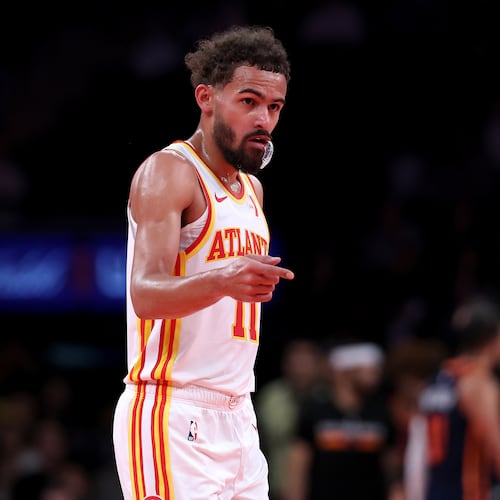In Wednesday’s win against the Suns, every member of the Hawks’ second unit finished as a plus-28 or higher.
That bench unit, which has had its fair share of struggles this season, took a nine-point lead and transformed it into a complete blowout, an impressive feat against the former No. 1 team in the Western Conference even considering the Suns were on the second night of a back-to-back.
As far as what kind of message that quality win sends, as the Hawks move within a half-game of the No. 4 Knicks and aim to finish in the top six? Interim coach Nate McMillan wasn’t concerned about it.
“That’s what we talked about, this team had the best record in the league. We knew they were a dangerous team. … Trying to send a statement, we’re focused on the game in front of us,” McMillan said.
What the Hawks’ three consecutive wins do convey, though, is after an injury-plagued season, they’re getting healthy at the right time, and that translates to their depth and talent on (nearly) full display.
In Wednesday’s balanced attack, no player scored more than 20 points, though the Hawks put up 135 points (seven players finished in double-digits). The last time that happened for the Hawks was Feb. 12, 1965 (St. Louis vs. Baltimore). The last NBA team to do that was Milwaukee (scoring 144 vs. the Hawks on Jan. 4, 2019).
Back from his ankle sprain, they’ve got a healthy Trae Young — third in the league in assists per game (9.5), leading the offense — and a healthy Bogdan Bogdanovic right beside him — second in the NBA in 3-pointers made since April 1 (80) and shooting 42.5% from beyond the arc — after missing most of January and February with an avulsion fracture in his right knee. The two are playing off each other well.
John Collins is back from a left ankle sprain and averaging 17.5 points and 7.5 rebounds.
A healthy Clint Capela continues to dominate in the paint and provide a lob threat, adding 15.3 points, a league-high 14.4 rebounds and fourth-most 2.1 blocks per game.
After missing time with right foot soreness, Danilo Gallinari has been great off the bench, averaging 14.6 points since returning April 23.
The Hawks are starting to look like the loaded team they were designed to be, with enough weapons to challenge teams in the playoffs, if this continues. For the past three games, the Hawks have had only two players out because of injury: De’Andre Hunter (right knee soreness) and Cam Reddish (right Achilles soreness).
That opens the Hawks’ options and allows their rotations to stabilize. Now it’s a matter of building chemistry among the groups. For the record, Hunter, who was enjoying a terrific sophomore season before knee issues sprang up, was able to play 3-on-3 on Wednesday and likely will get more live work over the weekend, with several off-days coming up. That bodes well for a potential return before the playoffs, which would add another guy to the mix.
The Hawks have five games left in the regular season — every game counts as they try to avoid the play-in tournament for 7-10 seeds, but this also is valuable time to make sure those starting and bench groups are clicking before the postseason.
“We are having to adjust and try to build some chemistry with all these guys coming back,” McMillan said. “We’re hoping to get a couple more guys back here soon. But what we’re trying to do is just build chemistry. And going down the stretch with both units and the sooner we can get guys back and we can get a rotation where I can feel comfortable, they can feel comfortable with the rotation, we can establish an identity with a full roster. Those are the things that we are having to work on at the end of the season, here.”
The past three games, Young, Bogdanovic, Tony Snell, Collins and Capela have started. That group has played a total of 96 minutes across nine games, with a net rating of 8.0. It stands to reason Hunter would re-enter the starting lineup if he were to return. That’s another change, so Hunter being available to play a few regular-season games to get back up to speed would be ideal, if possible.
Credit: Matt Slocum
Credit: Matt Slocum
The second unit of Lou Williams, Kevin Huerter, Solomon Hill, Gallinari and Onyeka Okongwu has played 40 minutes together across five games. Because of injuries and the Hawks trading Rajon Rondo to the Clippers at the trade deadline, acquiring Williams, the bench particularly struggled to find cohesion, until recently.
Players who have been paired with different combinations of guys throughout the season now can play with more or less the same unit.
“Now that we’re getting healthier, it’s been really beneficial for me and my growth, being able to go out there and play with the same players, over and over again. … It’s been good,” said Okongwu, who has taken a step forward the past month or so and had a career-high 14 points Wednesday. “We’re going to need everyone getting into the playoffs, and we’ve got to stay healthy and ready.”
A healthy Hawks roster actually is quite deep, and rotations only get shorter in the playoffs. McMillan has said he likes to go with nine or 10 guys. That could leave out a few players who have played important roles this season, including Hill (4.7 points in 21.7 minutes per game), who has been a good defender and utility player for the Hawks, and Snell (5.4 points in 21.1 minutes), a 3-and-D wing.
Defensive specialist Kris Dunn, who recently returned from injury and is still working back to 100%, is another example, as he didn’t play in the win vs. Chicago on Saturday or the win vs. Portland on Monday. That wasn’t because he had a setback, McMillan said, it’s simply a numbers game as the Hawks get more bodies back.
A lot of players will see their minutes go down, so the message to the team recently has been understanding sacrifice of individual playing time for the sake of team wins.
“They’re going to go down, and they’re going to go down for just about everybody,” McMillan said. “So that is the message, it’s going to happen, the more guys that we go back, it’s going to cut into minutes for everybody. It’s just part of it. I think if we look at it and we sacrifice, during this time, you’re going to play probably a few less minutes, but it should allow you to go even harder the minutes that you do get. If we do that, and we have that mindset, we can really be I think a tougher team and a team with a lot of depth.”
About the Author
Keep Reading
The Latest
Featured


